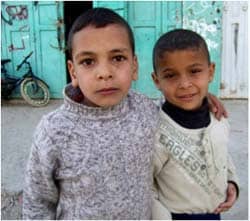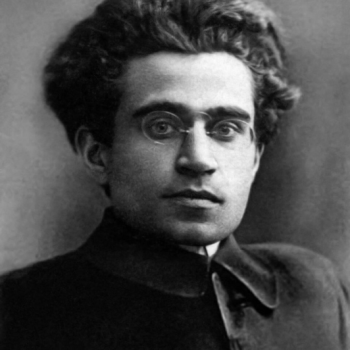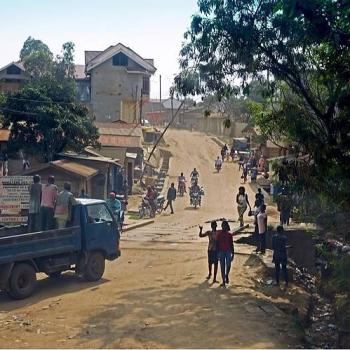Four years ago, in reply to an earlier Btselem report, the army spokesman's office issued a four-page letter justifying its actions. Hebron, it stated, "has been a hub for terrorist activity against Israeli civilians and the IDF alike." The letter cited "operational necessity" for the closure of shops and markets when "their opening poses a security threat." The army "strives to protect the lives of the Israeli civilians and itself, at a minimal cost to the daily routine of the Palestinian residents."
In reality the city center has become a dead zone. But even in the most depopulated areas, normal life has sought to assert itself. Around a corner from the old, pockmarked Municipal Inspector's Office, on a broad dead-end street sealed off at one end by concrete blocks and a security gate, are the outlines of a soccer field and the home of the woman who oversees its fragile existence.
Zleikha Muhtaseb's front door faces Shuhada Street, while the rear backs onto the old souk. That's where she meets me one afternoon, then leads the way up a twisting flight of narrow stone steps to a small roof-top garden and the entrance to her modest living room. Speaking fluent English, she tells me that members of her family have lived here for six generations.
 She's 45, a small, trim woman with twinkling eyes and a crooked smile. Her hair is always covered with a scarf for the sake of Islamic modesty. College-educated and divorced, she has many jobs: translator and advisor to the Christian Peacemaking Team, one of several outside groups that seek to observe and protect Palestinians here; owner of a small kindergarten in the old city; afternoon tutor of school children; evening manager of the youth soccer program.
She's 45, a small, trim woman with twinkling eyes and a crooked smile. Her hair is always covered with a scarf for the sake of Islamic modesty. College-educated and divorced, she has many jobs: translator and advisor to the Christian Peacemaking Team, one of several outside groups that seek to observe and protect Palestinians here; owner of a small kindergarten in the old city; afternoon tutor of school children; evening manager of the youth soccer program.
"All the children in Hebron are my children," she says. "They call me auntie, sometimes mother, sometimes teacher, sometimes by my first name."
The soccer teams started practicing in February in the afternoons on the dead-end strip below an Israeli military watchtower. Within a few days soldiers intervened. "They said, ‘You are not allowed to play here because this is Israel,'" Muhtaseb tells me.
After an hour-long argument, Muhtaseb says, the boys asked the soldiers if they'd like to play. The senior soldier at the scene laughed. "He told me, ‘Okay, we're going to play but on one condition: If we win, no football. If we lose, I will sign a paper that nobody will come here and ask you to stop playing.'"
The game never took place. Muhtaseb says the soldier backed down after his commander refused permission. Still, she says, the commander agreed that the children could play from 4 to 7 in the afternoon. "I said, ‘Okay, we have a deal.' Last night we played until 9:30."
Because she lives on Shuhada Street, Muhtaseb possesses a permit allowing her to walk in the area, but she says whenever she does she risks a confrontation with settlers. "Last Friday I was in front of my house. This girl yelled at me: ‘Go home, you're not allowed to go here.' I said no, I have the right, but she kept pushing me. And then a commander interfered and said she should stop. He was very strict with the settler. He said to her, ‘If you don't leave here, I will call the police.' For me it was a very big surprise."
The front door of Muhtaseb's house is sealed off with metal shutters. The windows are fitted with wire cages designed to protect them from rocks. A neighboring Palestinian family recently recorded with a cellphone a female settler who came to their front door and screamed at them: "Go into the house! Close the door! Shut your mouth!" Then the woman hissed "sharmuta" at the Palestinians, Arabic slang that translates loosely as "whore" or an obscenity for the female sex organ. "Sharmuta. You sharmuta, you and all your daughters." The woman repeated the word eleven times, with her face up against the cage, elongating the vowels.
After the segment played on Ynetnews.com, an Israeli news website, and was rebroadcast on Israeli television, Prime Minister Ehud Olmert expressed shame. The settler, identified in news reports as Yifat Alkobi, was questioned by police on suspicion of several violent attacks against Palestinians, then released. She filed a counter-complaint against the Palestinian family, claiming they had provoked her. The case is pending.
Given all of this, I asked Muhtaseb, what are the prospects for normal life in Hebron?
"We the Palestinians are famous for adapting to new situations. And Hebronites especially are stubborn, because we adapt all the time to every situation. It will not be normal normal, but we can normalize the abnormalities."




